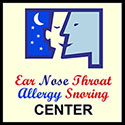Snoring and Sleep Apnea
 A warning sign of sleep apnea
A warning sign of sleep apnea
If you snore or live with someone who does, you’ve probably had a few good laughs over it. But snoring is no laughing matter. It is a symptom of sleep apnea. Snoring and Sleep Apnea are common but serious and potentially life-threatening conditions caused by obstruction of the airway during sleep. The affected person may literally stop breathing dozens, maybe hundreds, of times in one night, putting a strain on the heart and possibly shortening the person’s life span. Even people who snore but do not actually stop breathing may be at increased risk of stroke and heart disease.
Early recognition and treatment of sleep apnea is imperative, since sleep apnea can cause an irregular heartbeat, contribute to high blood pressure, heart attacks, and strokes. Death rates for people with obstructive sleep apnea may be increased by as much as seven times normal!
Sleep apnea symptoms occur when the muscles of the throat and tongue relax during sleep, partially blocking the person’s airway. Breathing becomes labored, snoring begins, and choking is common among sleep apnea sufferers. More often than not, the individual wakes up briefly, then returns to sleep without realizing how many times during the night he is being awakened. The sufferer never falls into a deep enough sleep to feel refreshed in the morning. He may suffer from early morning headaches. Depression, mood disorders, sexual dysfunction, cognitive difficulties, and inability to stay awake during daytime hours are other symptoms that lead to a chronic, damaging cycle that can eventually cause the person’s illness or even death due to the increased risk of heart attack and stroke.
Sleep apnea is not just a disease of older people, however. It can occur among all age groups and both men and women, although it is somewhat more common among men. One of the reasons may be that men tend to accumulate fat around their midsection, and abdominal fat is a contributing factor in sleep apnea. Along with being overweight, people are also likely to develop this disorder if they already snore loudly, or suffer from abnormalities of the nose and throat. Patient’s who have allergies or nasal congestion are also more likely to snore. In one study on healthy medical students, it was found that they developed sleep apnea when their noses were packed.
Those who suspect they have sleep apnea or have been diagnosed with sleep apnea should avoid alcohol, tobacco and sleeping pills. They should try to lose weight, as even a mild weight loss of 10% is beneficial in reducing symptoms. Additionally, those suffering with sleep apnea should retrain themselves to sleep in a side position, since sleeping on one’s back can contribute to airway collapse. Because of the serious consequences of sleep apnea it should be treated be a physician.
Patients diagnosed by a physician will be fitted with a special mask, called a ‘positive airway pressure device’. This mask fits over the patient’s nose and gently blows air through a tube down the patient’s nose and throat, forcing the airway open, and preventing the airway from collapsing during sleep. Most sufferers report an instant improvement in the way they feel the very next morning after using this device for the first time. There are many Sleep Centers throughout the country that specialize in diagnosing and treating sleep apnea. If you think you may be at risk, ask your doctor for a recommendation to a Sleep Center near you.
Measuring Sleep Apnea – The Apnea Hypopnea Index
The Apnea Hypopnea Index or AHI is one measure of the severity of a patient’s Obstructive Sleep Apnea (OSA). It is defined as the number of episodes of Apnea (breathing is completely blocked) and Hypopnea (breathing is partly blocked) occurred on average every hour during the sleep study.
